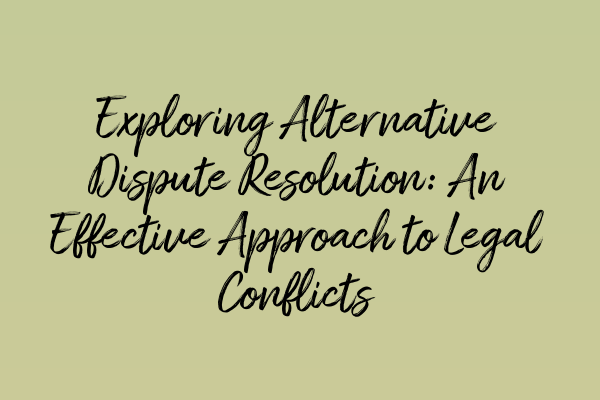Exploring Alternative Dispute Resolution: An Effective Approach to Legal Conflicts
Legal conflicts are a common occurrence in various fields of law, ranging from property disputes to commercial disagreements and personal injury claims. Traditionally, these conflicts have been resolved through the court system, which can be time-consuming, expensive, and adversarial. However, there is an alternative approach that is gaining traction in the legal world: Alternative Dispute Resolution (ADR).
ADR refers to methods of resolving legal conflicts outside of the courtroom, often with the assistance of a neutral third party. It provides parties involved in a dispute with a more flexible, cost-effective, and efficient way to resolve their differences. By promoting cooperation and collaboration rather than confrontation, ADR offers a win-win solution that benefits all parties involved.
There are several different types of ADR, including negotiation, mediation, and arbitration. These methods can be used individually or in combination, depending on the nature and complexity of the dispute. Let’s explore each of these methods further:
Negotiation
Negotiation is the most basic form of ADR and involves discussions between the parties to reach a mutually acceptable agreement. This can be done directly between the parties or with the assistance of their solicitors. Negotiation allows for more control over the outcome and can be a less formal and more flexible process.
Lease Extensions and Enfranchisement: Navigating Complex Legal Procedures. You may also want to check out our article on Lease Extensions and Enfranchisement: Navigating Complex Legal Procedures to learn more about this specific area of property practice.
Mediation
Mediation involves a neutral third party, known as a mediator, who facilitates communication and assists the parties in reaching a mutually acceptable resolution. The mediator does not decide the outcome but helps the parties explore their interests, identify common ground, and generate options for settlement. Mediation is a voluntary process that empowers the parties to control the outcome and maintain a positive relationship.
Solicitors Property Law: Key Principles and Practical Applications. For more information on property law principles and practical applications, take a look at our comprehensive guide: Solicitors Property Law: Key Principles and Practical Applications.
Arbitration
Arbitration involves the submission of a dispute to a neutral third party, known as an arbitrator, who acts as a private judge. The arbitrator considers the evidence, hears arguments from both sides, and makes a binding decision. Arbitration can be less formal than court proceedings and provides a faster and more confidential resolution. It is commonly used in commercial disputes and can save parties substantial time and costs.
Freehold vs Leasehold: Legal Implications Explored. We have a detailed article that explores the legal implications of freehold and leasehold properties, which you can read here: Freehold vs Leasehold: Legal Implications Explored.
The Benefits of ADR
ADR offers numerous benefits over traditional litigation. Firstly, it is generally faster and more efficient, allowing parties to resolve their disputes in a timelier manner. This can be especially advantageous for businesses, where delays can impact operations and profitability. Secondly, ADR is often less expensive than court proceedings, as it eliminates the need for lengthy trials and multiple court appearances.
SQE Case Studies in Property Law: Real-World Scenarios for Examination Success. If you are preparing for your SQE examinations and looking for real-world case studies in property law, our article on SQE Case Studies in Property Law: Real-World Scenarios for Examination Success might be of interest.
Another significant advantage of ADR is its flexibility and adaptability. Parties have more control over the process and can tailor it to suit their individual needs and interests. Unlike court proceedings, which have strict procedural rules, ADR allows parties to explore creative solutions and preserve their ongoing relationships. This can be particularly valuable in cases involving family disputes or ongoing business relationships.
Conclusion
Alternative Dispute Resolution offers a more efficient, cost-effective, and cooperative approach to resolving legal conflicts. By utilizing methods such as negotiation, mediation, and arbitration, parties can achieve mutually satisfactory outcomes and avoid the adversarial nature of court proceedings. Whether you are involved in a property dispute, commercial disagreement, or personal injury claim, considering ADR as an option may lead to a more favorable resolution in a timelier manner.
Mortgages and Land Law: Exploring the Interplay between Property and Finance. To further enhance your understanding of the interplay between property and finance, we recommend reading our article on Mortgages and Land Law: Exploring the Interplay between Property and Finance.
If you have any further questions about Alternative Dispute Resolution and its applicability to your specific legal conflict, do not hesitate to consult with a solicitor who specializes in ADR. They can provide personalized advice and guidance to help you navigate the process and achieve a favorable outcome.


Leave a Reply